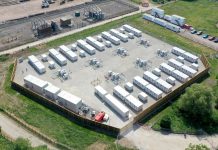Leaders of England’s 300-plus power co-operatives have slammed the Johnson administration’s Net Zero Strategy. They say it shuns the work of thousands of hard-working energy volunteers.
On Energy Day at the CoP26 climate summit, lobbyists Community Energy England have lambasted Whitehall mandarins and Westminster politicians – including Beis secretary Kwasi Kwarteng attending in Glasgow today – for giving citizen-led energy groups the cold shoulder, sacrificing their potential to enthuse voters about the meaning of Net Zero.
“The government’s Net Zero Strategy has no plan or support for community energy, and fails to put people at the heart of the energy system”, Community Energy England accuses.
CEE’s ‘State of the Sector 2021’ contains a vision for 2030. Independently checked, it reckons volunteer-led localities could power 2.3 million English homes, support 8,700 fulltime jobs and boost the UK economy by £1.8 billion.
None of that vision featured in Johnson’s Net Zero Strategy last month, says CEE. The blueprint ignored community energy completely, focusing instead on “large-scale, centralised supply side options”.
Mistrusted energy companies’ repeated bids to decarbonise homes & heat fail to match local groups’ results and credibility, CE England says, citing research.
In campaigns for energy efficiency, neighbourhood leadership delivers between up to 5 times the benefits achieved by commercial energy firms, says CEE.
Whitehall is blind to co-ops, but neighbours get the picture
And in benefits such as alleviating fuel poverty, volunteer community groups outpunch deep-pocketed firms by as much as 13 times, CEE’s research shows.
Eighty-two per cent of Brits support the idea of locals controlling clean power generation, says Community Energy England.
Witnessing local co-ops’ success in Germany, Denmark and Scotland, recent ministers Claire Perry and Chris Skidmore have told the group “the future of energy is local”, CEE says.
Away from neglectful Whitehall, other governments embrace volunteer-led localism more warmly, says the group. Germany’s 900 trading energy co-ops own between 25% and 40% of the country’s installed solar and wind farms. They can sell electricity direct to customers, a right which is denied to Brits.
Looking to double Scotland’s on-shore wind generation, Nicola Sturgeon’s coalition government is prioritising boosting community control of renewables as a chief concern. Holyrood’s short consultation ends on 22 January.
Whitehall’s capture by big power firms, raising corporations above furthering community empowerment, is deep-rooted, Community Energy England says.
CEE points to a 2014 community energy strategy presented by the Conservative-led Coalition, where Sir Ed Davie, now LibDem leader, served as energy secretary. The 2014 plan envisaged 1 million homes powered by volunteer-controlled energy by 2020.
“Instead, virtually every policy change since has made it more difficult to deliver local benefits”, CEE asserts.
Community Energy England stresses easy steps ministers could take to boost locals’ cleaning up of Britain’s power system;
- low-interest loans to help communities set up clean generating plant
- restoring tax breaks removed by George Osborne when chancellor
- levelling the playing field, so urban co-ops can attract finance as easily as rural ones
The umbrella body quotes the Climate Change Committee, independent scientific advisors to Beis.
“If (British) people are not engaged in this (decarbonisation) challenge, the UK will not deliver Net Zero by 2050”, the CCC reported to Parliament in June.
“People need to be brought into the decision-making process, to derive a sense of ownership of the Net Zero project”.
Read more on Community Energy England’s demands here.
Interest declared – the author invests in several English co-ops including SE24 Energy, CREW Energy and Brighton Energy Co-operative.




